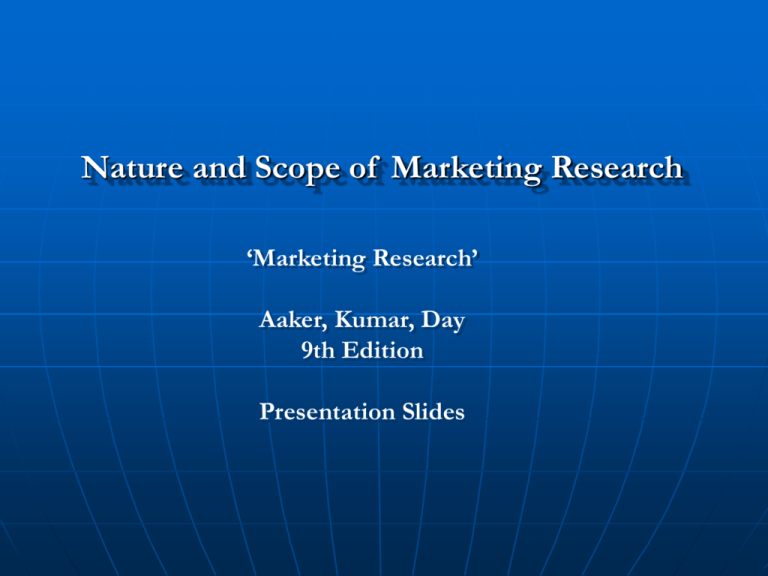Marketing Research - BEAN
advertisement

Nature and Scope of Marketing Research ‘Marketing Research’ Aaker, Kumar, Day 9th Edition Presentation Slides Business Intelligence Areas Business Intelligence Financial Management Marketing Research Primary sources Prospects Secondary sources Customers Marketing Accounting … Customer Relationship Marketing/Database Marketing Standardized Sources Competition Products/Markets Market Intelligence VS Marketing Intelligence Market Intelligence The process of acquiring and analyzing information in order to understand the market (existing and potential customers); to determine the current and future needs and preferences, attitudes and behavior of the market; and to access exchanges in the business environment that may affect the size and nature of the market in the future Marketing Intelligence The ability to fully understand, analyze and assess the internal and external environment related to a company’s customers, competitors, markets and industry to enhance the decision making-process. This would require the integration of competitive intelligence, marketing research, market analysis, and business and financial analysis information. Why do we need Marketing Intelligence? • Customer Satisfaction • Competitiveness • Business Achievement • Uncertainty Domains of Marketing Intelligence • Product decisions • Customer segmentation decisions • Brand and pricing decisions • Keeping stakeholders happy • Market estimation, competitive benchmarking, and distribution Marketing Planning Process Situation Analysis Strategy Development Marketing Program Development Implementation Control and Monitoring -Understand the environment and the market - Identify threats and opportunities - Assess the competitive position -Define the business scope and served market segments -Establish competitive advantages -Set performance objectives -Product and channel decisions -Communication decisions -Pricing -Personal selling decision -Performance monitoring -Refining strategies and program Factors influencing Marketing Research Decision • Relevance • Type and nature of information sought • Timing • Availability of resources • Cost-Benefit analysis Marketing Research Goal Programmatic Research To develop marketing options through: -Market segmentation -Market opportunities analysis -Consumer attitude -Product usage studies Selective Research To test different decision alternative: -New product concept testing -Advertising copy testing -Pretest marketing -Test marketing Evaluative Research To evaluate performance of program: -Tracking advertising recall -Cooperate and brand image studies -Measuring customer satisfaction Information System Day-to-day Intelligence for future strategies Research studies Decision Support Systems Decision Making Information Sources Information Supplier Internal Supplier External Supplier Accountant Report Customized Services Fiscal Report Syndicated Services … Standardized Services Field Services If there is no systematic, it’s take a lot of time to find needed information to make a decision. Selective Services Branded Product Services The Marketing Research Process Marketing Planning and Information System Agree on Research Process Planning Establish Research Objectives -Research questions -Hypotheses -Boundaries if study Estimate the value of information No Yes Design Implementation -Problems or Opportunities -Decision alternatives -Research users Design the research -Choose among alternative research approaches -Specify the sampling plan -Design the Experiment -Design the questionnaires Collect the data Prepare and analyze the data Report the research results and provide strategic recommendations Control and Monitoring Research Design Exploratory To seek insights into the general nature of a problem, the possible decision alternatives, and relevant variables that need to be considered Descriptive To provide an accurate snapshot of some aspect of the market environment Casual To show that one variable causes or determines the values of other variable Research Types Choice of Data Collection Research Tactics -2nd data -Qualitative or Quantitative -Surveys -Experiments Data Collection and Analysis Compare Cost & Timing Estimates Content of Proposal • Executive summary • Research purpose and objective • Research design • Time and cost estimates • Appendixes Qualitative Analysis • To obtain a basic feel for the problem before proceeding to the more analytical portion of the study • To find out what is in a consumer’s mind and perspective • To know more about things that cannot be directly observed and measurement such as feeling, thoughts, intentions, behavior • To get insight into the reality of the consumer perspective and to suggest hypotheses for further research More flexible, Depth, Richness of Context, Potential for new insights and perspective Qualitative Analysis Individual In-Dept Interviews Focus-group Discussions To interview face-to-face with the respondent To obtain possible ideas or solutions to a marketing problem from a group of respondents by discussing it Projective Techniques Observation To provide information on current behavior Focus-group Types 1. Exploratory Focus Group – defining the problem precisely 2. Clinical Focus Group – scientific endeavor 3. Experiencing Focus Group - emotional framework + More stimulation, Make new ideas, Meaningful comments more likely - Non representative of population, Unclear, Fallowing group Focus-group Projective Techniques 1. Word association 2. Completion tests 3. Picture interpretation 4. Third-person technique 5. Role playing 6. Case studies







